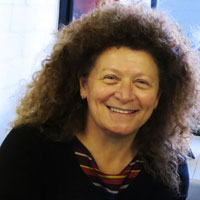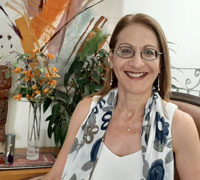Colloquium Committee
It is our pleasure to report back on our latest colloquium offering, Francisco Gonzalez’s (2020) paper, “Trump Cards and Klein Bottles: On the Collective of the Individual,” Psychoanalytic Dialogues, 30:4, 383-398.
This colloquium was, for us as moderators, both a challenge and a learning experience. We have previously noted that each colloquium develops its own unique course, tone, coloring and pace. But this most recent discussion did not fall into recognizable patterns. We needed then to welcome it as a novel, ‘other’ event, trying to be truly hospitable to our unknowing state. Only towards its ending could we see that, in many ways, this colloquium was again both a discussion and an enactment of its subject matter.
At the start, we felt the group to be hesitant, grappling with the “social” as with a large and mostly impenetrable unknown. A daunting unknown that could arouse helplessness and silencing, yet attracted and begged to be handled. We sensed a deep observation, a highly engaged mode of listening and digesting. Tentatively people approached, wrote, shared, dared. After the first weekend, more people joined, speaking up and speaking in, wanting to name and note a belonging to this group that had coalesced – pondering the dialectic of belonging and respecting; the bordering, intersecting and overlapping of ethics, politics and psychoanalysis.
As always, this tapestry was created by those who shared raw feeling and experience, exposed vulnerability, allowed a glimpse of how naked and frail we may feel when not resonated, when stripped from the belonging of an “us” or a “we.” Alongside were erudite posts fluent in the language and perspective of group analysis. We tried to extract and use the concepts offered when shifting from an individually-oriented psychoanalysis to a group-oriented one, moving among conceptions that see and treat the individual as a group. And we appreciated the posts observing the colloquium from a large socio-political perspective, as a happening in a world that is heaving in ways that we have yet to digest, ways that change the “us” so that we are compelled to redefine our “I.”
Perhaps our clearest observation is that the social unconscious was with us throughout. Pregnant with its hopes, dreads and desires. Alternatively unarticulated, and then yielding. Contained in the hopeful, helpful and painful allusions that our membership offered, staying put, staying open, remaining curious.
Francisco was sensitively nuanced and generous: he seemed to intuitively know when to pick up and when to contain, always digesting and thoughtful. Our team of panelists expanded meanings, while also introducing, elaborating and integrating different threads. Victor Donas (Chile), Susi Federici (Italy), Jill Gentile (USA), Orna Guralnik (USA), Afarin Kohan (Canada), Alexander Levchuk (Russia/Georgia), Gila Ofer (Israel), Juan Tubert Oklander (Mexico), Eyal Rozmarin (USA) and Sally Swartz (South Africa) freely shared their inspiration, wisdom and generosity. We so appreciated them for this.
As usual, we move now to preparing for the next colloquium, scheduled to run November 8–19, 2023. The paper will be Jody Davies’ (2015) “From Oedipus Complex to Oedipal Complexity: Reconfiguring (Pardon the Expression) the Negative Oedipus Complex and the Disowned Erotics of Disowned Sexualities,” Psychoanalytic Dialogues, 25(3): 265-283.
We send our best wishes to everyone and look forward to our time together again later in the year.
Cathy Hicks and Shlomit Yadlin Gadot, Colloquium Co-Chairs

Cathy Hicks, Ph.D.
Sydney, Australia
Email Cathy Hicks

Shlomit Gadot, Ph.D.
Ramat Hasharon, Israel
Email Shlomit Gadot

